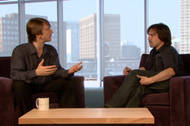Video series asks today’s leading scientists to tell their stories
If you’re like me, fascinated by science and its continued evolution and exploration but usually unable to make it through esoteric science journals without falling asleep, then you may want to check out “Cambridge Nights: Conversations About a Life in Science,” a series of interviews with academic scientists intended to give them the space to share their views and thoughts. Or, in other words, to tell their stories.
The series, brainchild of César Hidalgo, ABC Career Development Professor at the Massachusetts Institute of Technology (MIT) Media Lab and an assistant professor at MIT, wrapped up its first season at the end of November with eight videos of interviews with scientists who find themselves conducting research or teaching at leading universities in the Boston/Cambridge area of Massachusetts. The videos range from 20 to 45 minutes, with the last 10 or so dedicated to the subject’s personal life, career choices, and development.
Watching and listening to the interviews with some of today’s thought leaders, in which they describe their current work and theory as well as how they got to this point in their lives, makes the scientist’s specialty – and the scientist himself (so far all the interviews are with men) – more accessible and interactive than reading a research paper. Don’t get me wrong, research papers and journals are extremely important for the scientific world and community, but for us interested laypeople, the storytelling in the “Cambridge Nights” videos allows us to get a good basic understanding of the subject matter and the person behind it, perhaps spurring us on to deeper interest and reading.
For example, listen to Luis Bettencourt’s interview and you’ll hear him explain why people who live in New York City walk much faster than people who live in Topeka, Kansas, and why, contrary to what you’d think, large cities are less energy-intensive than more spread-out areas. Bettencourt, a professor at the Santa Fe Institute and a former researcher at the Las Alamos National Laboratory, then goes on to talk about how he eventually made his way to the U.S. and why he thinks that right now is not only an exciting but downright historical time for science in the U.S. and why so many scientists are coming here to work on issues together.
Or maybe Marshall Van Alstyne speaking about information exchange and “information markets” within companies and broader organizations is more up your alley. Van Alstyne, a professor at Boston University and a researcher at the MIT Center for Digital Business, explains that sharing information is a big productivity and profit booster within a company, but also presents challenges like how to motivate top performers to share information with average or low performers. Van Alstyne also discusses “information markets” across organizations or within a field of specialty. He cites the example of the Google.org Flu Trends page and how sharing data and data analysis can help people see trends and make decisions using that information.
A highlight for me was listening to Lant Pritchett discuss why he thinks the education world is too obsessed with “schooling” rather than educating and how and why governments control the curriculum of public schools. Pritchett, Professor of the Practice of International Development at the Harvard Kennedy School, also explains how his time as a missionary in Argentina influenced his career choices and why he’s a professor of “the practice” of international development and not solely a researcher of international development.
All in all, the talk show, even without a witty opening monologue, house band, and stupid pet tricks, is another great example of how using stories to explain complex ideas to plain old people can hook us into listening/watching/reading/consuming.




